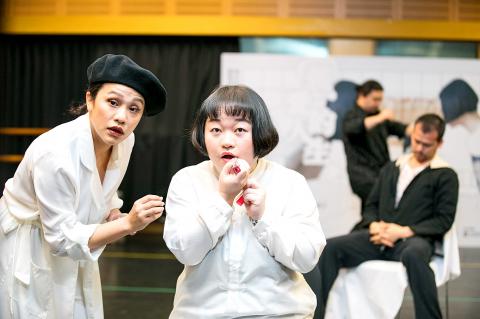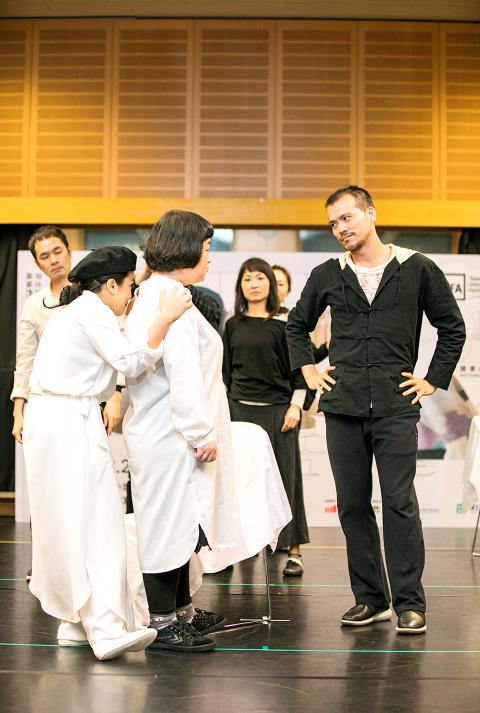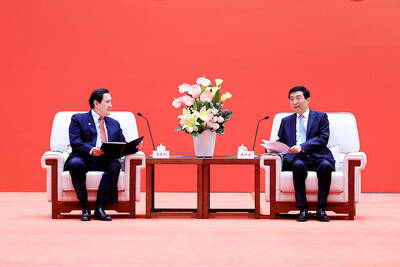Canadian Nobel laureate Alice Munro has a gift for describing the essence of the characters in her short stories with a just few brief words. One of Taiwan’s leading storytellers, Shakespeare’s Wild Sisters Group (莎士比亞的妹妹們的劇團) founder and director Wang Chia-ming (王嘉明), has a gift for writing and directing innovative plays with memorable characters.
So it should come as no surprise that Wang chose to draw inspiration for his company’s latest work, Dear Life (親愛的人生), from Munro’s 2012 collection of short stories by the same name.
Dear Life, created for the 10th Taiwan International Festival of Arts, opens at the National Theater in Taipei tomorrow night for a four-show run.

Photo Courtesy of National Theater Concert Hall
Wang often take the plots, story structures and style of his source material, adapts them to fit his performers as well as Taiwan’s social context, and then blends together different theatrical styles to create a uniquely original Wild Sisters Group show, much as he did with Blood & Rose Ensemble (血與玫瑰樂隊) — his retelling of William Shakespeare’s War of the Roses plays in the National Experimental Theater in May last year.
For Dear Life, he chose several stories from Munro’s book and adapted them to create new storylines that are distinct tales, yet echo one another.
He said he divided the show into four segments to highlight four stages of relationships: Memory, Ponds, Possessed and Tattoo.

Photo Courtesy of National Theater Concert Hall
Munro’s Dear Life collection is about leavings and beginnings, chance encounter, accidents and twists of fate, and Munro has said that some of the tales were very autobiographical.
Wang said that he found reading Munro to be like reading “anti-reasoning” stories, because while she writes about the great mysteries of life, “people often read the last word before they discover the puzzles that existed in the work.”
He was also interested in exploring the “ecosystem” of short stories, as well as how a short story can actually explain a character’s entire life.

Photo Courtesy of National Theater Concert Hall
The cast includes dancers/choreographers Sunny Yang (楊乃璇) and Chen Wu-kang (陳武康). The choice of Chen, who acted in the Performance Workshop’s (表演工作坊) 2016 show The Comedy of Sex and Politics (新龍門客棧) and Yang highlights what has been a defining interest of Wang’s works — shows created with artists from other genres.
Wang also included Wu Rong-chang (吳榮昌) of the Hong Puppet Theater (弘宛然) — who worked on The Party Theater Group’s (同黨劇團) The White Storyteller (白色說書人) in the Experimental Theater in October last year — and Hakka singer Huang Pei-shu (黃珮舒) in his cast.
Other cast members include several Shakespeare’s Wild Sisters stalwarts such as Fa and Angie Wang (王琄), as well as Lai Wen-chun (賴玟君), An Yuan-liang (安原良), Yu Pei-zhen (余佩真), Wu Rong-chang (吳榮昌), Li Ming-chen (李銘宸), Yao Kun-jun (姚坤君) and Jimmy Zhang (張吉米).
Dear Life runs about 110 minutes without intermission and will be performed in Mandarin, with English surtitles. There will be pre-show talks in the theater lobby before the two evening performances and Saturday’s matinee. There will be a post-show talk in the lobby after Sunday’s matinee.
This story has been updated since it was first published to note that English-language surtitles will be provided during the performances.

The canonical shot of an East Asian city is a night skyline studded with towering apartment and office buildings, bright with neon and plastic signage, a landscape of energy and modernity. Another classic image is the same city seen from above, in which identical apartment towers march across the city, spilling out over nearby geography, like stylized soldiers colonizing new territory in a board game. Densely populated dynamic conurbations of money, technological innovation and convenience, it is hard to see the cities of East Asia as what they truly are: necropolises. Why is this? The East Asian development model, with

Desperate dads meet in car parks to exchange packets; exhausted parents slip it into their kids’ drinks; families wait months for prescriptions buy it “off label.” But is it worth the risk? “The first time I gave him a gummy, I thought, ‘Oh my God, have I killed him?’ He just passed out in front of the TV. That never happens.” Jen remembers giving her son, David, six, melatonin to help him sleep. She got them from a friend, a pediatrician who gave them to her own child. “It was sort of hilarious. She had half a tub of gummies,

The wide-screen spectacle of Formula One gets a gleaming, rip-roaring workout in Joseph Kosinski’s F1, a fine-tuned machine of a movie that, in its most riveting racing scenes, approaches a kind of high-speed splendor. Kosinski, who last endeavored to put moviegoers in the seat of a fighter jet in Top Gun: Maverick, has moved to the open cockpits of Formula One with much the same affection, if not outright need, for speed. A lot of the same team is back. Jerry Bruckheimer produces. Ehren Kruger, a co-writer on Maverick, takes sole credit here. Hans Zimmer, a co-composer previously, supplies the thumping

There is an old British curse, “may you live in interesting times,” passed off as ancient Chinese wisdom to make it sound more exotic and profound. We are living in interesting times. From US President Donald Trump’s decision on American tariffs, to how the recalls will play out, to uncertainty about how events are evolving in China, we can do nothing more than wait with bated breath. At the cusp of potentially momentous change, it is a good time to take stock of the current state of Taiwan’s political parties. As things stand, all three major parties are struggling. For our examination of the